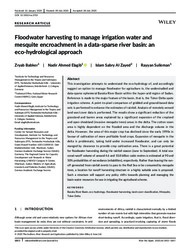Floodwater harvesting to manage irrigation water and mesquite encroachment in a data-sparse river basin: an eco-hydrological approach
DOI: https://doi.org/10.1002/rra.3703
Persistent URL: http://resolver.sub.uni-goettingen.de/purl?gldocs-11858/9358
Persistent URL: http://resolver.sub.uni-goettingen.de/purl?gldocs-11858/9358
Babker, Zryab; Elagib, Nadir Ahmed; Al Zayed, Islam Sabry; Sulieman, Rayyan, 2020: Floodwater harvesting to manage irrigation water and mesquite encroachment in a data-sparse river basin: an eco-hydrological approach. In: River Research and Applications, Band 36, 9: 1852 - 1867, DOI: 10.1002/rra.3703.
 |
Dokument öffnen: |
This investigation attempts to understand the eco-hydrology of, and accordingly suggest an option to manage floodwater for agriculture in, the understudied and data-sparse ephemeral Baraka River Basin within the hyper-arid region of Sudan. Reference is made to the major feature of the basin, that is, the Toker Delta spate irrigation scheme. A point-to-pixel comparison of gridded and ground-based data sets is performed to enhance the estimates of rainfall. Analysis of remotely sensed land use/cover data is performed. The results show a significant reduction of the grassland and barren areas explained by a significant expansion of the cropland and open shrubland (invasive mesquite trees) areas in the delta. The cotton sown area is highly dependent on the flooded area and the discharge volume in the delta. However, the area of this major crop has declined since the early 1990s in favour of cultivation of more profitable food crops. Expansion of mesquite in the delta is problematic, taking hold under increased floodwater, and can only be manged by clearance to provide crop cultivation area. There is a great potential for floodwater harvesting during the rainfall season (June to September). A total seasonal runoff volume of around 4.6 and 10.8 billion cubic metres is estimated at 90 and 50% probabilities of exceedance (reliabilities), respectively. Rather than leaving the runoff generated from rainfall events to pass to the Red Sea or be consumed by mesquite trees, a location for runoff harvesting structure in a highly suitable area is proposed. Such a structure will support any policy shifts towards planning and managing the basin water resources for use in irrigating the agricultural scheme.
Statistik:
ZugriffsstatistikSammlung:
- Geographie, Hydrologie [454]
Schlagworte:
Baraka River Basineco-hydrology
floodwater harvesting
land-cover classification
Mesquite
Toker Delta
This is an open access article under the terms of the Creative Commons Attribution License, which permits use, distribution and reproduction in any medium, provided the original work is properly cited.

